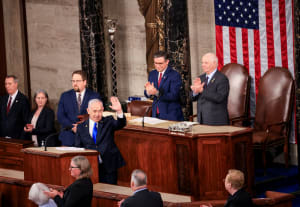Northern Israel residents fuming over US-negotiated plan for Hezbollah border withdrawal
Lobby group calls reported plan ‘surrender to an Iranian terror organization’

Residents of northern Israel reacted furiously to reports detailing a U.S.-negotiated proposal to de-escalate the tense situation on Israel’s northern border and facilitate a withdrawal of Hezbollah’s terror forces.
Lobby 1701, which represents the around 80,000 residents of northern Israel who were forced to evacuate their homes due to the daily missile attacks by Hezbollah, published a furious statement after Israeli media reported about the proposal to Israeli officials during U.S. envoy Amos Hochstein's visit on Sunday.
According to Israel’s Channel 12 news, the proposal in effect aims to bring about the implementation of UN Resolution 1701 from 2006 and was met with cautious agreement by Israeli officials.
“The emerging agreement is a mark of Cain to the State of Israel,” Lobby 1701 stated in a reference to Genesis 4:15.
“This is surrender to an Iranian terrorist organization and the price is being paid now by the residents of the north, and in the future, will be paid by all Israeli citizens.”
“The residents of the north have learned the hard way that agreements with Hezbollah help them arm themselves with missiles and more means and nothing else… Lobby 1701 calls on the State of Israel not to give up the northern part of the country, and to sign such an agreement on the actual abandonment of the north,” the statement read.
Ynet news reported that despite Hochstein receiving the green light for the proposal from Lebanese officials, Hezbollah’s stance was unknown.
According to the first step of the proposal, Israel and Hezbollah would sign an interim agreement, according to which Hezbollah would withdraw its forces between 8 to 10 kilometers (5-6 miles) from the Israeli border, the Times of Israel reported.
The second phase of the agreement is conditioned upon the success of the first phase.
In this scenario, Israel and Lebanon would begin negotiations over a final demarcation of their land border, with the U.S. offering incentives for Beirut to agree to a deal.
Both countries do not have an internationally recognized border, instead being divided by the “Blue Line,” a ceasefire line established by the United Nations in 2000.
In 2022, Hochstein, the U.S. senior advisor for energy to President Joe Biden, facilitated the agreement between Israel’s government led by then-Prime Minister Yair Lapid and Lebanon to demarcate their maritime borders in the Mediterranean Sea.
Hochstein has been a leading figure in diplomatic efforts led by the U.S. and France to de-escalate the violent skirmishes between Israel and Hezbollah, which the terror group began in October in support of Hamas.
On Sunday, the U.S. envoy met with Israeli Defense Minister Yoav Gallant, who thanked him for “his personal role and the U.S. administration’s leadership in addressing security issues in the northern arena.”
“We are committed to our citizens. We are ready to resolve this crisis via diplomatic understandings, however, we are also prepared for any other scenario,” Gallant added.

The All Israel News Staff is a team of journalists in Israel.













